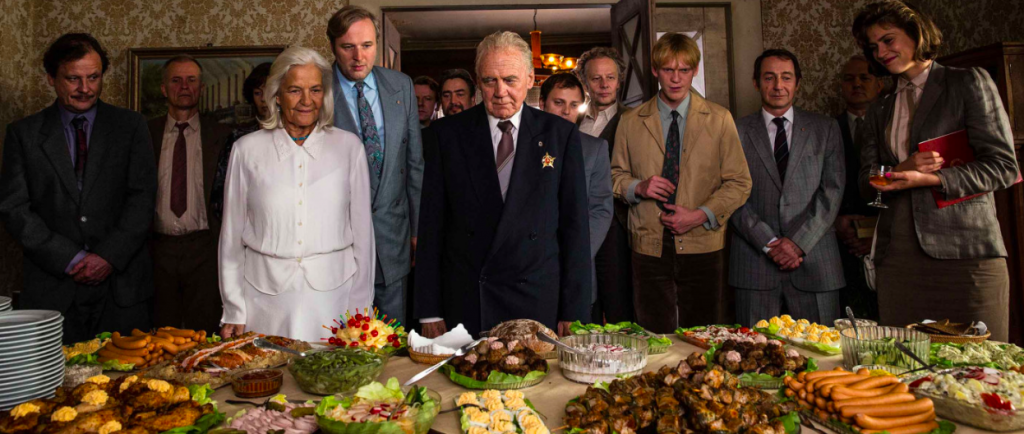There have been occasions when the German Film Festival has chosen to kick off with an echte deutsche Komödie. This allowed many iterations of that lazy gag about German comedy being a contradiction in terms. This year the Germans have returned to more familiar territory: earnest dramas, with perhaps a touch of Olympian irony. This is the kind of humour astute critics have discerned in the novels of Thomas Mann between lengthy bouts of philosophising. Less astute critics have found nothing funny at all.
Last year the Goethe Institute announced it would be holding no more film festivals, but after a one-year lay off the festival is back. It always seemed a short-sighted decision given the enduring popularity of film festivals in Australia. When the French, Italians, Spanish, Japanese, Russians, Koreans and dozens of others are going strong, it was absurd for the Germans – of all people! – to opt out.
Every year at the movies follows a familiar pattern of boom and bust, with important releases at Academy Awards time and a dearth thereafter. The festivals allow cinephiles a chance to savour something a little less mainstream than Deadpool 2 or Peter Rabbit. The only problem this year is that both the French and the Spanish have wheeled out their own version of mainstream, with an abundance of frivolous flicks.
This is why we need the Germans: to remind us there are other reasons to go to the movies aside from mere escapism. The opening night feature is Lars Kraume’s The Silent Revolution, based on a true story from 1956 about a group of East German high school students who staged two minutes of silence in solidarity with the Hungarian uprising that had been savagely put down by the Soviets. This small gesture reverberated as far as the Minister for Education, putting the students under enormous pressure and jeopardising their future prospects.
I’ve yet to see The Silent Revolution, but it sounds promising. It’s not the only feature about the former GDR, which is becoming fertile territory for contemporary German filmmakers. In Times of Fading Light features Bruno Ganz as Wilhelm, an elderly hard-liner celebrating his 92nd birthday in the company of his family and assorted apparatchiks. It’s the autumn of 1989 and the iron curtain is suddenly full of holes. The birthday party is looking pretty shakey as well.
Matti Geschonneck has made a film in which all the small details of life in East Germany add up to a picture of a thoroughly loathsome society. The lesser characters wallow in hypocrisy and sycophancy, the senior figures, such as Wilhelm, have become as hard as concrete.
Mademoiselle Paradis is a period drama, based on the story of Maria Theresia von Paradis (Maria Dragus), a gifted blind harpsichordist who is treated for her affliction by the famous Dr. Franz Mesmer (Devid Striesow). Today we may think that Mesmer’s theory of animal magnetism sounds like the height of quackery, but by the standards of 18th century medicine he was a true progressive. Director, Barbara Albert, has given us a sympathetic portrait of Mesmer, and of Mademoiselle Paradis, whose skill with the keyboard goes to pieces as her vision improves.
This is alarming for the patient, but even more so for her parents who fear for their income and social status should their daughter lose her musical abilities. If blindness is the price of success then that’s too bad.
Another accomplished film is Paula, Christian Schwochow’s bio pic of Paula Modersohn-Becker (1876-1907), the first German female artist to have a museum devoted to her work. Like Van Gogh it all happened posthumously for Modersohn-Becker, whose paintings attracted little attention during her lifetime. She had her champions, such as the poet, Rainer Maria Rilke, but was constantly ridiculed for her spontaneous, quasi-naïve, proto-expressionist style.
Carla Juri plays Paula as an eccentric, free spirit, always pulling faces and going against the grain. She spent almost her entire artistic career in the artists’ community of Worpswede, near Bremen, where she met and married the painter, Otto Modersohn (Albrecht Shuch). After five years in which their union remained unconsummated Paula left for Paris, where her work and love life took a turn for the better.
Movies about artists often play out like soap operas with berets, and Paula is not immune from this tendency. Characters speak in pronouncements, most probably drawn from the artist’s letters and journals. Inevitably, lots of mean things are said about women and their abilities as artists. This is chiefly so we can say to ourselves: “That’s what you think!” The unusual character is Rilke (Joel Basman), whose extreme delicacy and pretentiousness makes him seem virtually retarded. Certainly no writer ever tried harder to give the impression of literary genius, but was he really as weird as this?
By the way, if you are hanging out for some German humour, the festival features a high school trilogy called Fack Ju Göhte, which remains err… untranslated in the program. It’s billed as a mix of “laugh-out-loud comedy and burning social issues”.
German Film Festival 2018
Sydney, 22 May – 5 June; Canberra, 23 May – 6 June; Melbourne, 24 May – 6 June; Brisbane, 31 May – 10 June; Adelaide, 30 May – 10 June..
germanfilmfestival.com.au
Published in the Australian Financial Review, 19 May, 2018

